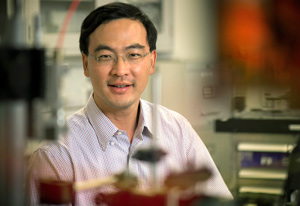- News
22 April 2015
University of Texas at Arlington developing UV lasers to detect chemical and biological weapons agents
Weidong Zhou, an electrical engineering professor at University of Texas at Arlington who specializes in nanophotonics, is using a federal grant to construct a small laser for detection systems to do a more efficient job at spotting chemical and biological agents used for weapons.
The $600,000 award is part of an overall, three-year, $4.3m US Defense Advanced Research Projects Agency (DARPA) grant to make ultraviolet laser detection more available in the field. The multi-institutional project is led by Michigan State University.
 Picture: University of Texas at Arlington professor of electrical engineering Weidong Zhou.
Picture: University of Texas at Arlington professor of electrical engineering Weidong Zhou.
Zhou aims to develop low-cost, compact UV lasers to detect very small amounts of chemical and biological agents. The goal is to create a new class of UV lasers that are more than 300 times smaller and 10 times more efficient than current lasers.
The resulting technology could be dropped into current detection systems to save size, weight and power or to create new systems that are smaller and more sensitive. "It's like shining a light to find one of these chemical or biological agents… like finding these agents' fingerprints," Zhou says.
"The Army needs something that's portable," he adds. Existing laser technologies that use light to determine where agents are present are huge and bulky. The systems sometimes require trucks to be transported. "They certainly can't be taken into the field or moved easily," Zhou notes. DARPA wants to reduce the size to something a person could carry, and to reduce the cost too.
Khosrow Behbehani, dean of the UT Arlington's College of Engineering, says that Zhou's laser technology has applications beyond how the US Department of Defense might use it. "Zhou's cutting-edge technology could aid physicians in medical diagnostics through those same ultra-sensitive lasers that detect harmful chemical or biological agents," he adds.
Zhou says other applications of the new lasers could include advanced manufacturing, secure communications, environmental monitoring and compact atomic clocks.


